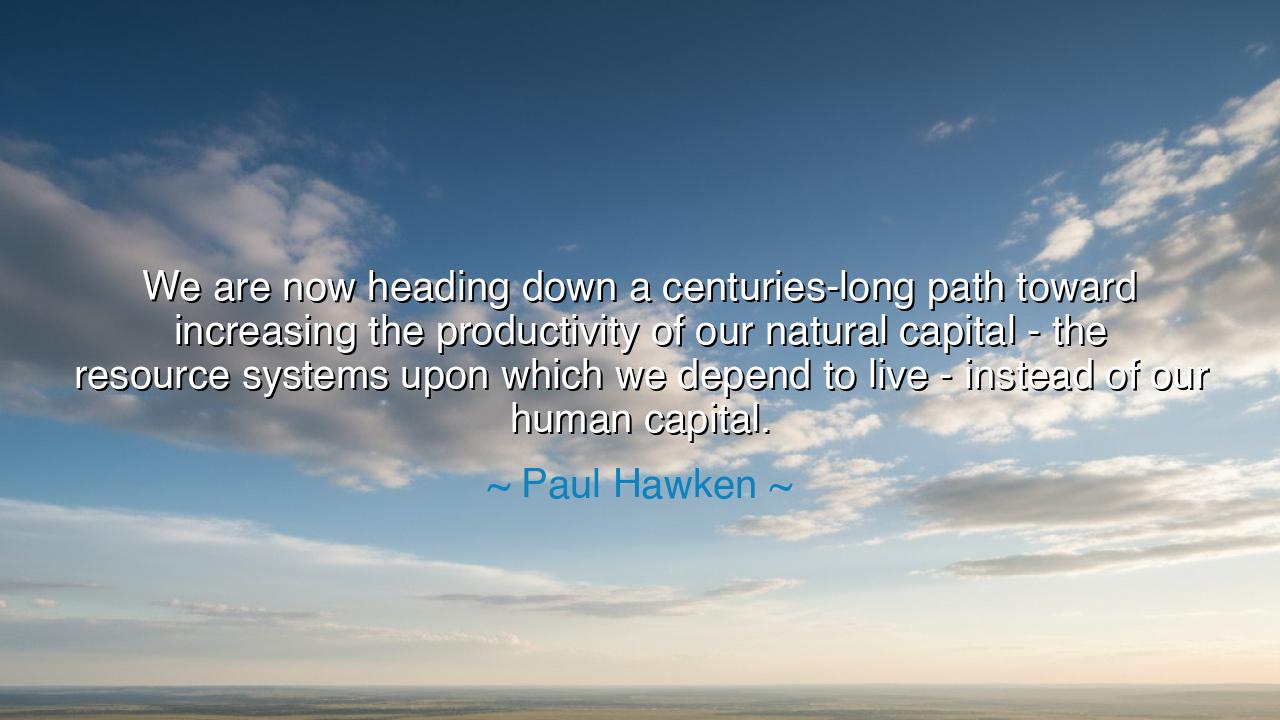
We are now heading down a centuries-long path toward increasing
We are now heading down a centuries-long path toward increasing the productivity of our natural capital - the resource systems upon which we depend to live - instead of our human capital.






In the councils of elders, where the grain of wisdom is milled against the stone of time, it was taught that a household prospers by tending both its fields and its children. Paul Hawken’s saying—“We are now heading down a centuries-long path toward increasing the productivity of our natural capital—the resource systems upon which we depend to live—instead of our human capital.”—names a turning of the age. For centuries we strove to squeeze more from hands and hours: faster looms, longer shifts, taller ledgers. Now, he says, the great work is different: to make forests, soils, rivers, reefs, winds, and sunlight flourish in such a way that they yield more life with less harm, and to measure prosperity by the health of the living fabric that holds us.
To hear him rightly, we must reckon with the two treasuries. Human capital is skill, craft, knowledge, and community—the sparkle of minds and the steadiness of hearts. Natural capital is the mother chest: fertile soil, clean water, pollinators, a forgiving climate, minerals, and all the quiet services of the wild. When we pursued the old road alone—seeking only to raise the productivity of people—we often did so by spending down the earth: clearing the forest to expand the factory, dredging the river to speed the barge, burning the ancient sun stored in coal to light the present hour. Hawken’s insight is not a scorn for industry; it is a re-ordering of genius. He bids us turn invention toward the resource systems themselves—restoring, mimicking, and partnering with them—so that they become more resilient, abundant, and generous over the coming centuries.
Consider a parable from our own era: New York City faced a choice—build a colossal filtration plant or restore its mountain watershed in the Catskills. The city chose the living option: protect forests, manage farms, re-stitch wetlands, compensate stewards. By investing in natural capital, the water cleansed itself through root and soil, saving billions while strengthening towns upriver. No factory was whipped harder; no worker’s back was bent further. Instead, the stream’s productivity was raised by honoring its design. Here the future announced itself: prosperity born from partnership with nature, not conquest.
Another story rises from the yellow hills of the Loess Plateau. There, terraces, trees, and careful water-keeping turned dust into gardens. Floods slowed; springs returned; incomes climbed. A landscape once exhausted by the race to wrest grain from thin soil became wealthy by nursing the soil back to strength. This is what Hawken means by a “centuries-long path”: the patient craft of healing natural capital until it yields steady harvests and steady peace, long after a single grant or headline has faded.
Do not mistake him: he does not call us to neglect human capital; he calls us to recruit it. The new inventor is the farmer who measures carbon in his field and finds it rising; the engineer who designs buildings that cool with wind and shade; the fisher who sets aside nursery waters so tomorrow’s catch returns in strength; the entrepreneur who sells “light as a service,” profiting by lower energy use rather than higher. In each case, intelligence and skill turn toward the living base—so that the base grows. We are not abandoning people for plants; we are training people to make the plants, soils, and seas abundant again.
From this saying, take a clear law: spend less of the world and more of the mind. Let the metric of success be not only output per worker, but also water per raindrop, crop per photon, comfort per watt, shelter per tree, and well-being per hectare restored. When we arrange our cities, trades, and rituals by this law, we reverse the old drain of wealth: every year the aquifer is fuller, the forest older and larger, the fish more numerous, the air gentler—while livelihoods deepen and communities steady.
Let counsel become practice. For households: choose goods that are durable, repairable, and energy-frugal; plant where roots cool and feed; favor diets that grow soil rather than strip it. For firms: design for reuse, remanufacture, and service models that reward efficiency; account for the true cost of resource systems and the dividends of restoring them. For towns: protect watersheds, weave trees into streets, harvest rain, electrify heat and transport, and buy power from sun and wind that will still arrive when our grandchildren wake. For nations: pay farmers and fishers as guardians of natural capital, not only as extractors of yield; measure progress by restored ecosystems as well as by coins. Walk this path with patience worthy of centuries, and Hawken’s vision will cease to be a prophecy and become our daily bread: a civilization that grows rich by making the living world richer still.






AAdministratorAdministrator
Welcome, honored guests. Please leave a comment, we will respond soon